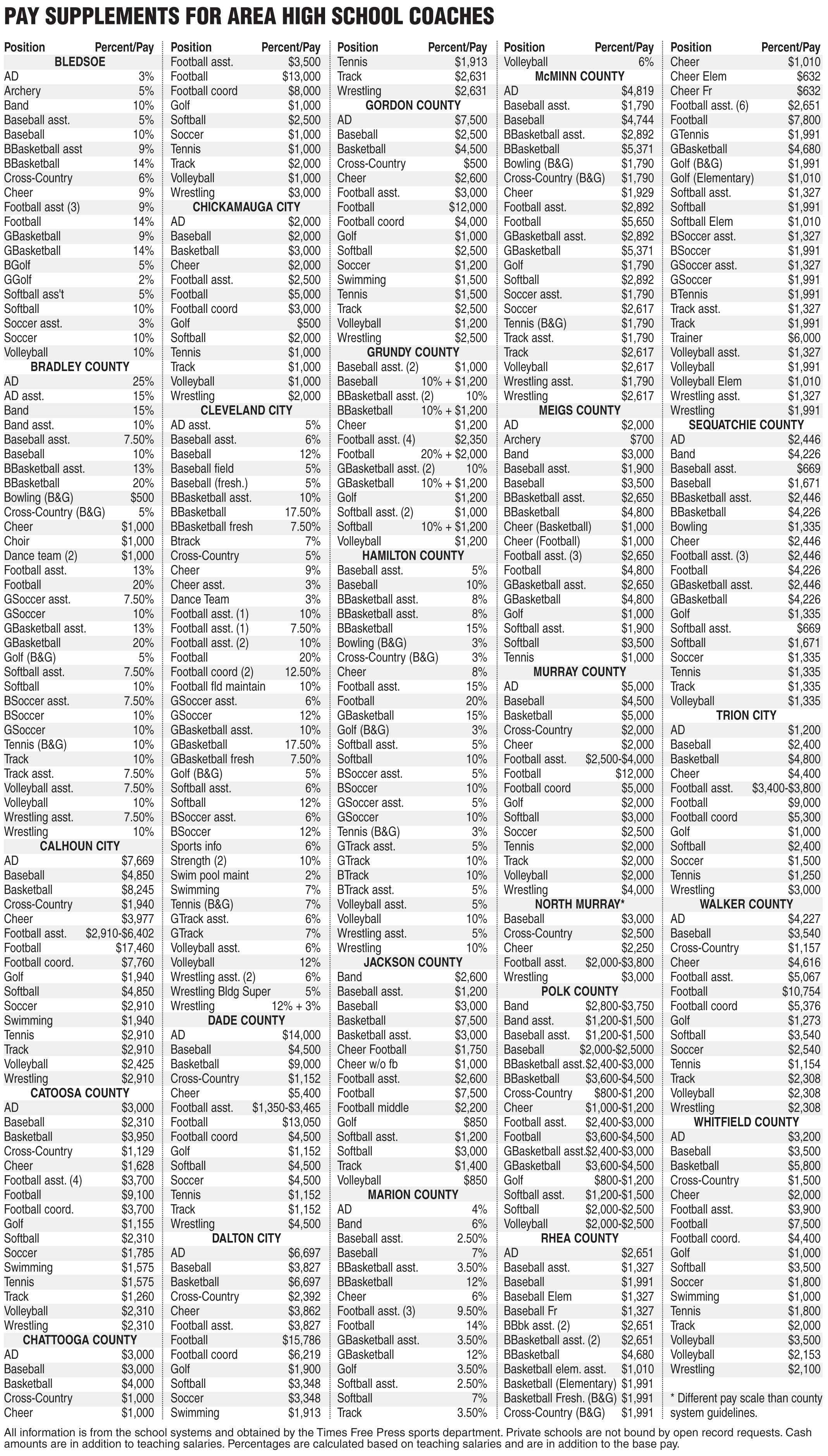Prep athletic directors not in it for the money
Monday, July 2, 2012
Read more
Set supplement for some, salary percent for othersVolunteer assistant coaches prove vauluableGeorgia peachy in prep supplements
If the following classified advertisement were listed under employment opportunities, how interested would you be?
"Opening for hard-working, very organized and ethical individual to oversee a staff of 22 professionals. Duties include, but are not limited to, interviewing potential employees, organizing schedules, overseeing several athletic fields, serving as a liaison between state officials and your bosses plus those under you, allocating funds, making sure your staff follows strict guidelines and determining the eligibility of about 200 teenagers for athletic competition. Salary: $0."
Not very alluring, huh? Well, that's the description of the athletic director position in Hamilton, Polk and Grundy counties and Cleveland City schools, where an assortment of administrators and coaches perform a job that receives extra compensation in every other school system in the area.
For some, such as Hixson's Brian Bray and Red Bank's Mandi Munn, it's a matter of stepping into a void to help out. For others, like Lookout Valley's Joe Galloway, it's a case of "If it isn't broke ..." In all cases there is very little reward for doing what can be a tedious, time-consuming, frustrating job.
"I guess I do it out of the goodness of my heart," said Bray, who took over AD duties three years ago. "Really, I love Hixson and I'm doing it for the school, and when you have a great administration like we do, you want to help out. A lot of the athletic directors in Hamilton County are assistant principals, so this gives me administrative experience, and that's something I'm interested in."
Munn, the Red Bank softball coach, soon will begin her second year as the AD and echoed Bray's thoughts on being happy to help. The lack of a supplement, though, was a bit of a surprise.
"Susan Thurman held the job for a long time, and when she retired I was asked to replace her and I quickly accepted it," Munn said. "At first, though, I was shocked I wouldn't be receiving a stipend. At Red Bank, though, there isn't that much I have to do. I'm lucky that the coaches we have do pretty well handling things on their own. The way I look at it, if it helps my school I'm glad to do it."
Money for the athletic director position was removed when the county and city school systems merged beginning with the 1997-98 school year. Galloway was well into his 35-year tenure at Lookout Valley at that time, and like many of his AD brethren he just kept doing the work despite the reduction in pay.
"We were told we wouldn't be getting the supplement any longer, but everybody just kept doing it to help the principals out," said Galloway, who still is the school's AD despite being retired. "There have been a lot of budget cuts over the years, and that was just one of them. If we didn't do it the job would fall on the principals, and they're already maxed out."
Delegating authority, the "volunteers" all agree, is the key to making it work without spending too much time on the unpaid position.
"You have to have folks who want to cooperate with each other," Galloway said. "And we are fortunate to have people in the building like David Dinger and Pat Conard who have been around awhile. They know what's going on, and younger coaches can feel free to ask them questions if I'm not available."
Added Bray: "The key is to keep an open line of communication between your coaches and the administration and parents and make sure your coaches aren't afraid to ask questions. I don't micro-manage these coaches, but they know what's expected. I do make sure our kids are eligible, which is a huge part of an AD's responsibility. You have to dot all the I's and cross all the T's."
Robert Akins said the $3,000 he gets paid to handle the AD chores at Ringgold isn't what keeps him in the position. What matters, the veteran football coach said, is the difference he can make in the direction of the Tigers programs and the influence he can have on the other coaches.
"It's certainly not the money involved," he said. "Being an athletic director is more about training coaches about doing it the right way. That's by far the most important thing an AD can do. It's a tough job in that you have to be equitable to all the sports and things that make a difference. You also have to decide what's not as important. What might be good for one sport might hurt another.
"Sometimes, honestly, it's not worth the headache, but I also know I don't want anyone else to have the job. I'm sure that's why the guys in Tennessee who don't get paid keep doing it. You have to have a servant's attitude, and it's nice to know you make a difference."

